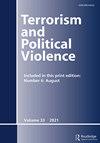青少年网络仇恨内容接触与分享的机会与自我控制关系之探讨
IF 2.1
2区 社会学
Q1 INTERNATIONAL RELATIONS
引用次数: 1
摘要
互联网的兴起极大地增加了青少年接触网络仇恨内容的程度,并简化了与他人分享这些内容的过程。查看含有仇恨言论或诋毁他人语言的信息会增加个人激进化极端主义观点和接受暴力意识形态的风险。研究人员已经开始探索接触此类内容的风险因素,此前的研究表明,自制力低下与在线活动之间存在重要关联。很少有研究利用青年样本来评估这些关系,或探索自愿消费和分享内容。本研究试图利用南澳大利亚州1193名青少年提供的自我报告回应来解决文献中的这一差距。我们估计了一系列定量模型,以评估自我控制、使用在线和离线措施查看内容的机会以及与暴露或分享仇恨内容相关的四个因变量之间的关系。我们对犯罪学理论对激进化和打击暴力极端主义的效用的理解的这种分析的含义进行了详细的讨论。本文章由计算机程序翻译,如有差异,请以英文原文为准。
Exploring the Relationship between Opportunity and Self-Control in Youth Exposure to and Sharing of Online Hate Content
ABSTRACT The rise of the Internet has dramatically increased the degree to which youth may be exposed to online hate content, and simplified the process of sharing this content with others. Viewing messages that contain hate speech or language vilifying others can increase an individual’s risk of radicalization to extremist views and the acceptance of violent ideologies. Researchers have begun to explore the risk factors for exposure to such content, with prior studies demonstrating a relationship between low self-control and online activities being important correlates. Few studies have utilized youth samples to assess these relationships, or explored the voluntary consumption and sharing of content. This study attempts to address this gap in the literature using self-report responses provided by a sample of 1,193 youths in South Australia. A series of quantitative models are estimated assessing the relationships between self-control, opportunities to view content using both on and off-line measures, and four dependent variables related to exposure to or sharing of hate content. The implications of this analysis for our understanding of the utility of criminological theory to radicalization and countering violent extremism are discussed in detail.
求助全文
通过发布文献求助,成功后即可免费获取论文全文。
去求助
来源期刊

Terrorism and Political Violence
Multiple-
CiteScore
5.60
自引率
8.30%
发文量
87
期刊介绍:
Terrorism and Political Violence advances scholarship on a broad range of issues associated with terrorism and political violence, including subjects such as: the political meaning of terrorist activity, violence by rebels and by states, the links between political violence and organized crime, protest, rebellion, revolution, the influence of social networks, and the impact on human rights. The journal draws upon many disciplines and theoretical perspectives as well as comparative approaches to provide some of the most groundbreaking work in a field that has hitherto lacked rigour. Terrorism and Political Violence features symposia and edited volumes to cover an important topic in depth. Subjects have included: terrorism and public policy; religion and violence; political parties and terrorism; technology and terrorism; and right-wing terrorism. The journal is essential reading for all academics, decision-makers, and security specialists concerned with understanding political violence.
 求助内容:
求助内容: 应助结果提醒方式:
应助结果提醒方式:


